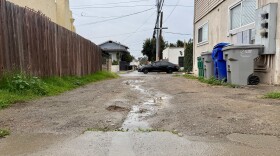MAUREEN CAVANAUGH: This is KPBS Midday Edition, I am Maureen Cavanaugh. While many San Diego have been focused on the city's mayoral race, County supervisor Dianne Jacob's State of the County address recently outlined plans and priorities for a whole region. This ranged from a call for state law against gang pimping to a pledge for better oversight of the counties assisted-living facilities. Meanwhile the county continues to earn AAA credit rating sports financial management of the newbie 59 dollars budget, the questions remain to whether another that budget is going towards essential services for San Diego. Would like to welcome my guest Dianne Jacob. In your state of the County address you called prison realignments, that is the policy that keeps more nonviolent felons in county jail instead of state prison, you called it a mess. DIANNE JACOBS: Yes. MAUREEN CAVANAUGH: This program just this week, we heard a SANDAG reportedly heard from County probation chief Mack Jenkins, he said that realignment is working pretty well. What you call it a mess? DIANNE JACOBS: Asked the people in our neighborhoods and the get the recent statistics, property kind crimes are up and since realignment and auto thefts are up, and our jails overcrowded. You might ask yourself where are the long breakers going if there is no more room in the jails? They are out in our communities. As good of a job as Mack Jenkins and Bonnie Dumanis are doing, certainly this County is situated better because of our financial situation. Will it be enough? The problem is state prisoners and state parolees that we are receiving are different than our normal population, and that is why you are seeing a higher rate of recidivism amongst those who were repeating crimes versus those in our normal population. It's not a good situation in the state historically has been solving problems in Sacramento instead of solving problems in the county. MAUREEN CAVANAUGH: The thing that they actually have reduced recidivism and Mack said that they need more funding, the wanting them and they would like to see changed is more programs to keep prisoners out of county jails and into rehab programs of some kind, and I am wondering, is that County working with law enforcement to direct funding towards developing programs like that? DIANNE JACOBS: Absolutely, that is a priority of the Board of Supervisors and is go through this population, that is take those who are the most likely and who would be eligible for work programs, and teach them some work skills, and get them out into the community so that they have jobs and so they become productive members of society that is a goal of the Sheriff's Department. Difficult the as I mentioned earlier this is a more difficult population that is coming to us, and as Mack indicated there is no question about it, the County of San Diego was the team that we have in place to do a much better job with this population in the state, we need the adequate resources and need the adequate funding in order to get job and make sure that our neighborhoods are safe and right now, they are becoming increasingly unsafe because of the realignment and that is why a call that a mess. MAUREEN CAVANAUGH: Another question about criminal activity, you mentioned Matthews is a continuing problem for the county, recent statistics show that Matthews and deaths from meth is dramatically up, and most massive now comes from Mexico rather than created in San Diego County, what has the meth strike force team done to retool focus from labs to import? DIANNE JACOBS: Enough strikeforce is a multidisciplinary of approach approach. His multijurisdictional and it is a unique concept. That we don't know what we look at this meth report card, the latest one is not good. What we don't know is what with the situation be like in San Diego County if we had not formed that at strikeforce, the good news is we are no longer known as the meth capital, that is a good news, and the bad news is that left deaths are up, and we do not have our arms around the problem and again it is education continually getting people in the community that have their eyes and ears open to any suspected meth use and meth dealing and meth production. And to reported to the anonymous hotline. That is followed up with loss law enforcement of the important appropriate agencies. Unfortunately meth is still a preferred drug among many and that includes your people to. In the end there is no question, method the use of meth means death. MAUREEN CAVANAUGH: You aware that the strike force has retooled its approach in any way because of the change from the labs in these counties and producing meth as opposed to meth being imported from Mexico? DIANNE JACOBS: Definitely, there is not the number of labs in these counties, and that was the main problem, there are some simple labs that pop up once in a while, people can make meth in an apartment building, but with the drugs coming over the border, as far as retooling strategies, it's still coming into San Diego County and people are still using it and it is still a problem,, and at some point in time hopefully our federal government will give their arms around the immigration issue and make sure that our border is locked down and so we're not allowing drugs of any kind to come into San Diego. MAUREEN CAVANAUGH: Another thing that you mentioned is the counties mentioned to beef up rural fire protection, this is on a lot of people's mind right now because of the potential that the drought poses the creative virus this year. Will the county the taking on extra program option percussions this year? DIANNE JACOBS: We continue our efforts to beef up world fire protection and in 2008 we formed the county fire authority and we are contracting with hellfire to provide the actual services and it was a three-phase process to consolidate any of those world fire agencies and we are in the third phase. We are in the world protection district which is lost. Largest. Folding those in to make one and to achieve increased more efficiencies and actually do some cost savings, but the bottom line is the county continues to invest more money into the county fire authority so it continue to improve on that, but I want this to be the best prepare that we can be and working with other agencies, we're not there yet, as far as with the drought and the dryness in our backcountry, we have year-round fire threat. Wet or dry, it's year-round fire threat. The goal is to make sure that we have the resources for a quick response time to jump on those fires while they are small and under 10 acres and put them out so they do not become the big blazing infernos that we saw in 2003 and 2007. And quicker response times for medical emergencies, we focus on fire a lot, that the majority of the fire department does and a fourth fire authority response to emergencies. MAUREEN CAVANAUGH: I am wondering under the Board of Supervisors because of all we heard about the potential fire danger, for use concerned about this year and what San Diego might face? DIANNE JACOB: Absolutely, very concerned, the weather that we're having now, it is notable whether compared to what they're having in the East, however we are having 70 to 80∞ weather here and we have not had rain and is very dry and the fire risk becomes a higher risk than normal. MAUREEN CAVANAUGH: Now in your district, the humble Indian village has broken ground on a 200,000 ft.≤ casino in Jamul, why are you opposed to the casino? DIANNE JACOB: I am supporting close to 100% of the community which is opposed to the casino this location and has been opposed to it for twenty years, and thinking back the casinos of Las Vegas and his out of Las Vegas Most recently Lakes entertainment and now we have this Hollywood Penn national coming into town And of the others have enabled to a compass this, it's a forty? Possible personal and highly ninety-four, Tulane ninety-four that already is heavily impacted by traffic, people die on these roads and many many collisions occur, it's the public safety issue more than anything else, and there is no way that I know to mitigate the impacts of the traffic on this road and we're talking about lives and changing a community that is very rural. MAUREEN CAVANAUGH: Hasn't Caltrans studied this and they are giving the hood to this plan? DIANNE JACOB: Date issued a temporary management plan for construction and the county has sued Caltrans and the reason for that is our attorneys believe that you cannot separate the traffic impacts from construction of the project for the project itself if you look at any of the developer whether the city or County, they have to analyze the total impacts of the project at one time under the California environmental quality act and you cannot separate the two, so the lawsuit is to make sure that Caltrans complies with their own state laws. MAUREEN CAVANAUGH: That they talk about some other things that you talked about, and the county speech, he mentioned some initiatives to counties undertaking of energy sustainability. Can you tell us about that. DIANNE JACOB: Is a program called to be choice aggregation, this is just a fancy term for providing consumers choices on whether they can buy their electricity, they have dented up north and in a couple of the counties, and I want to see us do it here, this is the year that we will take a look at our strategic energy plan, that is a part of it. But we can as the county government we can shop around for pricing on our electricity, and we have done that for many years and we have saved a couple million dollars to put into other services, the problem is that consumers do not have the same choice But to be choice aggregation you put a petition into the market and give consumer choices and you hope that the combination you would drive down the price. MAUREEN CAVANAUGH: Is this specific come competition for SD G & E? DIANNE JACOB: Yes. MAUREEN CAVANAUGH: Have you had competition and the good push back on this plan yet? DIANNE JACOB: No. MAUREEN CAVANAUGH: Under the leadership [ [ CHECK AUDIO ] ]issued a study that comes first, and hoping that the county will fall on the backs of that and with the city and County have other jurisdictions could chime in on that because that is a very innovative plan and one of the things however that the twenty-fifth the climate action plan by the county, one of the reasons that that was sort of pushed back on and challenges because it was not innovative enough, and the county is looking for long-range plans or any other kind of management plan that they have a little more innovated in the way they think about how to deal with climate control and air and pollution? DIANNE JACOB: Always has to be a balance in our economy and our businesses, there would drive the other kinds of things the government does providing deputy sheriffs in the case of the county of the street and parks and libraries of all the amenities that the government provides, it's all the tax generated coming from our businesses and mostly small businesses, so we have to keep in mind with whatever we do on other programs that we continue to enhance the environment for business to grow, but at the same time to keep our eye on some creative and innovative ways that we can tackle the energy and renewable energy and businesses and so on a visit businesses to which are growing very fast. MAUREEN CAVANAUGH: I have a lot of more questions for you but I'm out of time and I appreciate you taking the time to speak with us today. DIANNE JACOB: Thank you so much.
While many in San Diego have been focused on the city's mayoral race, County Supervisor Dianne Jacob's "State of the County" address recently outlined plans and priorities for our whole region.
Chair of the San Diego County Board of Supervisors, Jacob delivered the address, which ranged from a call for a state law against gang pimping to a pledge for better oversight of the county's assisted living facilities.
The county continues to earn triple-A credit ratings for its financial management of a nearly $5 billion budget, but questions remain as to whether enough of that budget is going toward essential services for San Diegans.









